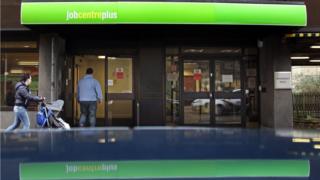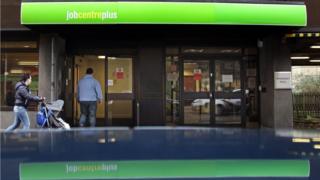Benefits freeze to end in 2020, government confirms
The first rise in four years is the latest spending pledge made by ministers ahead of the general election. …

 Image copyright Getty Images
Image copyright Getty Images The freeze in benefit payments is to come to an end next year, the government has confirmed.
Working-age benefits such as universal credit and jobseeker’s allowance will rise by 1.7% from April 2020, the Department for Work and Pensions said.
It ends former Tory chancellor George Osborne’s decision to introduce a freeze from April 2016.
Labour called it a “cynically-timed” announcement ahead of the general election on 12 December.
BBC political correspondent Nick Eardley said the move will be seen by some as an election pitch to poorer Leave-backing areas.
Our correspondent added it follows a raft of other spending commitments made by Boris Johnson since he became prime minister, including funding for the NHS, schools and police.
The benefits freeze – announced in the 2015 Budget – was intended to last until the end of the current financial year.
Former chancellor Philip Hammond said in March that the freeze would end as planned and that the then administration had “no intention of repeating the current freeze”.
He added: “When it is over, increases in benefits will resume in line with [the CPI rate of inflation] in the normal way.”
Rather than increasing each year in line with inflation – to reflect the rising cost of living – most working-age benefits and tax credits have been kept at the same value for more than four years, having last risen in April 2015.
Groups such as the Joseph Rowntree Foundation have argued that this has been among the biggest factors in exacerbating poverty levels among working families with children.
Other benefits that have been frozen but are now set to rise, by inflation, are: Employment and support allowance, income support, housing benefit, child tax credits, working tax credits and child benefit.
Some of these are legacy benefits, which are being replaced by universal credit.
The government also said the state pension – which has not been frozen because of the so-called triple lock – will increase by 3.9%.
Disability benefits and carer’s allowance, which have not been subject to the freeze, will also increase by 1.7% next year.
The increase in benefits is expected to cost £5bn; ministers say the decision to end the freeze will help 10 million people.
The benefit freeze has cut an average of £560 per year from the income of the country’s poorest seven million families since 2016, according to the Institute for Fiscal Studies. That’s more than £2,000 of lost income those families have had to cope with, and the end of the freeze next April doesn’t reverse what amounts to a 6% cut in real terms in their income.
And remember, some of those families have experienced earlier benefit cuts too, so they’ll have been struggling even more.
A few more quid each week will undoubtedly help, but next April’s long-planned increase needs further context.
Pensions will rise at more than double the rate than working age benefits will increase, despite more children living in poverty than older people. And restricting the benefits paid to families who have more than two children will also contribute to rising levels of child poverty, according to the Resolution Foundation.
And for those who say, “well they should just get a job”, bear in mind that in-work poverty is the fastest-rising category of poverty in the UK. Having a job is not a guarantee of not being poor.
Work and Pensions Secretary Therese Coffey said: “We’re clear the best way for people to improve their lives is through work, but we know some people require additional support.
“Our balanced fiscal approach has built a strong economy, with 3.6 million more people in work since 2010. And it’s that strong economy which allows us to bolster the welfare safety net by increasing benefit payments for working-age claimants now.”
Labour, which is promising to scrap universal credit in a revamp of the benefits system, pointed out the freeze would remain in place for a number of months yet.
Adam Corlett, senior economic analyst at the Resolution Foundation, a think tank focusing on people on lower incomes, described the announcement as a “missed opportunity” that would not increase living standards.
“The benefit freeze was always due to end next year. The government’s confirmation that working-age benefits will only keep pace with rising prices means there will be no increase in living standards, and those in need of extra support will continue to be left behind,” he said.
“With child poverty at risk of hitting record highs, this is a missed opportunity to provide a much-needed boost for low to middle income families.”
Two-child benefit limit
The announcement comes as a committee of MPs warned the government’s policy of limiting welfare benefits to two children must be scrapped because it forces families to stretch “frozen and capped” incomes to “breaking point”.
The Work and Pensions Select Committee said the government had not offered evidence to counter forecasts that the policy will “significantly increase” child poverty.
The two-child limit means that in families where there are already two or more children, the child element in universal credit and tax credits – worth £2,780 per child per year – is restricted to the first two children. It applies to children born after 6 April 2017.
As well as the two-child limit, there also remains a cap on the total amount of benefits one household can claim. The cap was lowered in 2016, further cutting the amount of benefits some people received.
Grace period for car park fines
Meanwhile, the government has proposed that private car park operators are obliged to give drivers a 10-minute grace period after their tickets expire before issuing fines.
Local Government Secretary Robert Jenrick said he wants a compulsory code of practice for the industry to “restore common sense” to the issuing of parking fines and “crackdown on dodgy operators” in England, Scotland and Wales.
Do you receive benefit payments? Will an end to the freeze help you or your family? Share your thoughts by emailing haveyoursay@bbc.co.uk.
Please include a contact number if you are willing to speak to a BBC journalist. You can also contact us in the following ways:
- WhatsApp: +44 7756 165803
- Tweet: @BBC_HaveYourSay
- Text an SMS or MMS to 61124 or +44 7624 800 100
- Please read our terms of use and privacy policy



